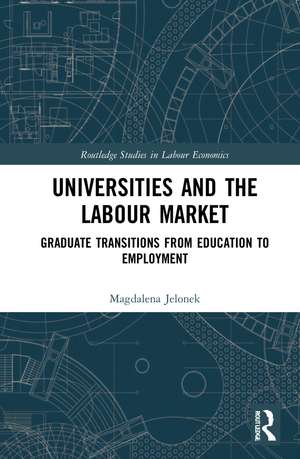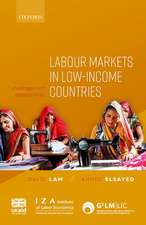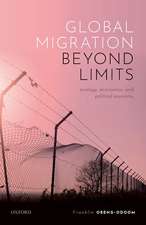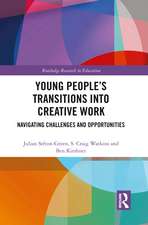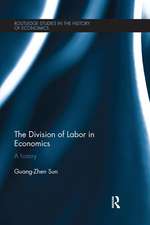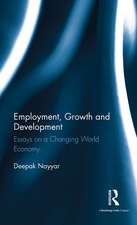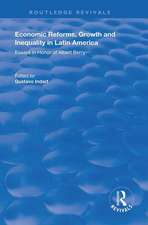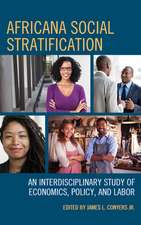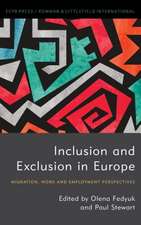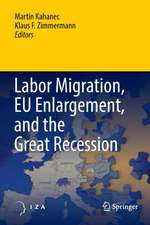Universities and the Labour Market : Graduate Transitions from Education to Employment: Routledge Studies in Labour Economics
Autor Magdalena Jeloneken Limba Engleză Hardback – 31 dec 2021
The chapters summarise several years of author original research, including study on the employability of graduates in Poland more specifically, and the effects of their public interventions to increase graduate employment and facilitate entry into the workforce (e.g. Commissioned Fields of Study, Competences Development Programme). More generally, university - labour market relations are analysed from three perspectives: micro (understood as individual characteristics shaping educational and occupational choices and decisions), and meso and macro (e.g. features of the education system and such as the strength of the signal sent by HE diplomas; the macroeconomic situation and the condition of the labour market and the state of debate on general and employability competences and its implications). The conclusions made are pertinent given ongoing debates around graduate mismatch in the labour market, as well as the questioning of tuition fees and the role of the university in society more broadly.
The interdisciplinary nature of this book makes it of great interest to academics, researchers and postgraduate students in the areas of sociology, economy, public policy, and also to practitioners designing educational interventions themselves.
Din seria Routledge Studies in Labour Economics
-
 Preț: 326.07 lei
Preț: 326.07 lei -
 Preț: 289.87 lei
Preț: 289.87 lei -
 Preț: 326.49 lei
Preț: 326.49 lei -
 Preț: 324.24 lei
Preț: 324.24 lei -
 Preț: 305.51 lei
Preț: 305.51 lei -
 Preț: 311.41 lei
Preț: 311.41 lei - 18%
 Preț: 1169.16 lei
Preț: 1169.16 lei - 17%
 Preț: 258.30 lei
Preț: 258.30 lei - 17%
 Preț: 258.50 lei
Preț: 258.50 lei -
 Preț: 389.38 lei
Preț: 389.38 lei - 20%
 Preț: 272.50 lei
Preț: 272.50 lei -
 Preț: 387.53 lei
Preț: 387.53 lei - 19%
 Preț: 271.76 lei
Preț: 271.76 lei - 17%
 Preț: 257.49 lei
Preț: 257.49 lei -
 Preț: 393.52 lei
Preț: 393.52 lei - 18%
 Preț: 263.36 lei
Preț: 263.36 lei - 24%
 Preț: 368.38 lei
Preț: 368.38 lei - 17%
 Preț: 257.41 lei
Preț: 257.41 lei - 18%
 Preț: 997.73 lei
Preț: 997.73 lei - 18%
 Preț: 900.29 lei
Preț: 900.29 lei - 18%
 Preț: 1000.27 lei
Preț: 1000.27 lei - 18%
 Preț: 1005.73 lei
Preț: 1005.73 lei - 18%
 Preț: 951.96 lei
Preț: 951.96 lei
Preț: 998.71 lei
Preț vechi: 1217.94 lei
-18% Nou
191.10€ • 200.24$ • 157.98£
Carte tipărită la comandă
Livrare economică 12-26 aprilie
Specificații
ISBN-10: 036774225X
Pagini: 162
Ilustrații: 13 Tables, black and white; 3 Line drawings, black and white; 3 Illustrations, black and white
Dimensiuni: 156 x 234 x 15 mm
Greutate: 0.41 kg
Ediția:1
Editura: Taylor & Francis
Colecția Routledge
Seria Routledge Studies in Labour Economics
Locul publicării:Oxford, United Kingdom
Public țintă
Postgraduate and UndergraduateCuprins
Notă biografică
Descriere
Debate surrounding the employability of graduates has been around for many decades, and interest in this area has grown particularly since the start of this century. Tackling this relevant area of scholarship, this book uses an innovate approach to analyse the relationship between university and the labour market from different perspectives, taking into account both sociological and economic theories. Key areas explored include work transition, graduate employability, and the effects of public interventions/initiatives which are aimed at matching the competences of graduates to labour market needs.
The chapters summarise several years of author original research, including study on the employability of graduates in Poland more specifically, and the effects of their public interventions to increase graduate employment and facilitate entry into the workforce (e.g. Commissioned Fields of Study, Competences Development Programme). More generally, university - labour market relations are analysed from three perspectives: micro (understood as individual characteristics shaping educational and occupational choices and decisions), and meso and macro (e.g. features of the education system and such as the strength of the signal sent by HE diplomas; the macroeconomic situation and the condition of the labour market and the state of debate on general and employability competences and its implications). The conclusions made are pertinent given ongoing debates around graduate mismatch in the labour market, as well as the questioning of tuition fees and the role of the university in society more broadly.
The interdisciplinary nature of this book makes it of great interest to academics, researchers and postgraduate students in the areas of sociology, economy, public policy, and also to practitioners designing educational interventions themselves.
